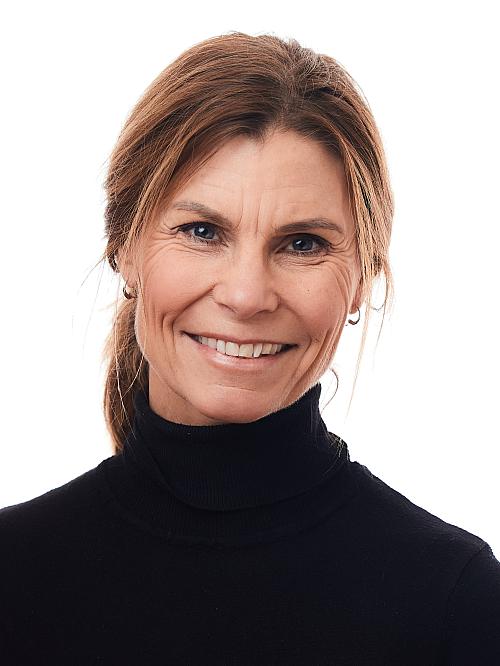Saliva – one of the body's superpowers
Did you know that the saliva performs many important functions for the body and our general well-being? The 50 visitors to the popular series JU LIVE learned more about this in the latest lecture. Malin Stensson, Associate Professor in Oral Health Science at the School of Health and Welfare at Jönköping University (JU), explained the importance of saliva under the heading “The amazing saliva – one of the body's superpowers”.

Malin Stensson’s lecture on saliva attracted great interest.
Malin Stensson opened the lecture by speaking about her background and how she started her research on saliva. When she was working as a dental hygienist several years ago, she had the opportunity to become a doctoral student, focusing on oral health in children and young people with asthma. In her research, she learned more about saliva and gained a deeper understanding of how saliva can affect oral health in various ways.
“I have taken an interest in saliva because it has so many important functions for both oral and general health. I want to draw attention to the fact that if saliva production is reduced, it can affect both health and quality of life, and people may need support from dental and healthcare services,” she says.
The audience learned that saliva consists of 99 per cent water, but that the remaining one per cent contains several important components. These include electrolytes, enzymes, proteins and immunological components that strengthen the immune system. On average, adults produce 1–1.5 litres of saliva per day, while children and older people produce around 0.75–0.80 litres.
Tips for dealing with dry mouth
Approximately one in five adults in Sweden experiences dry mouth. This can be caused by medication, illness, stress or dehydration. People with insufficient saliva may experience poor oral health, difficulty chewing and swallowing, and an increased risk of inflammation and infection, thereby reducing their quality of life.
Malin shared some tips on what you can do yourself to reduce dry mouth and increase saliva production.
- Drink water regularly – small sips throughout the day are best.
- Eat fibre-rich and chewy foods – these stimulate the salivary glands.
- Avoid dehydrating substances – such as alcohol, caffeine, tobacco and spicy foods.
- Use saliva-stimulating products – lozenges or saliva substitutes, available over the counter at pharmacies.
- Chew sugar-free gum – increases saliva flow and protects against tooth decay.
- Review your medication – some medicines cause dry mouth, consult your doctor or pharmacist.
- Visit the dentist regularly – they can provide advice and treatment if necessary.
Another important function of saliva is as a diagnostic tool for detecting diseases. Unlike blood tests, it is painless, simple and quick, and saliva contains many biological markers. There is still much research to be done on saliva as a diagnostic tool, and Malin is convinced that we will be able to benefit even more from saliva in the near future.

"What's so interesting about saliva is that there's so much we don't know, and so many diagnostic possibilities that can reveal diseases in both the mouth and the body. New analyses are being developed all the time," she says.
Current research
In a collaborative project with Malmö University, the Public Dental Service in Region Jönköping County and researchers from Valencia in Spain, saliva is being used to identify caries risk in young people. In the study, around 100 different substances in saliva have been analyzed, with the aim of finding substances in saliva that can serve as predictors of caries risk.
Another ongoing project, in collaboration with Linköping University Hospital and researchers from Valencia, analyses saliva from children at 12 months of age. The aim is to investigate how early life factors affect the bacterial flora in saliva.
“We are also planning a larger study in collaboration with Region Jönköping County, where saliva samples will be collected from over 1,000 people aged 5 to 80+ during dental visits. In this study, we want to investigate several important questions, including whether saliva can show how much environmental pollution we are exposed to, how the composition of saliva changes with age, and how saliva can be used for early detection of diseases," says Malin Stensson.
“The JU LIVE setup is fantastic”
For Ingemar Claesson, one of the audience members, it was his second time at JU LIVE. He had driven from Vetlanda to listen to the lecture and found it very interesting.

Ingemar Claesson was pleased with the lecture.
“I hadn't really thought about saliva that much before, to be honest. Today, I learned that saliva is important, that it can be used to analyze diseases, that it helps to heal wounds, and much more. I think the JU LIVE format is fantastic. The fact that the researchers explain things in a way that is easy to understand raises general knowledge. It's quite fun to see that researchers are ordinary people too,” says Ingemar Claesson.
Blogs by Malin Stensson at Vertikals (in Swedish):
Grönsaker och goda munbakterier, en perfekt kombo för hälsa! Opens in new window.
- Associate Professor Oral Health Science
- School of Health and Welfare
- malin.stensson@ju.se

